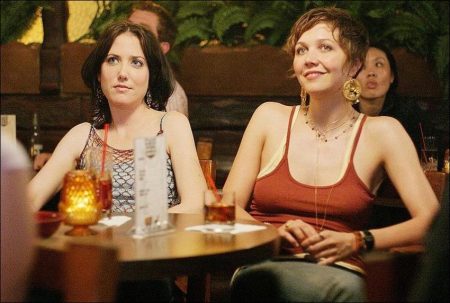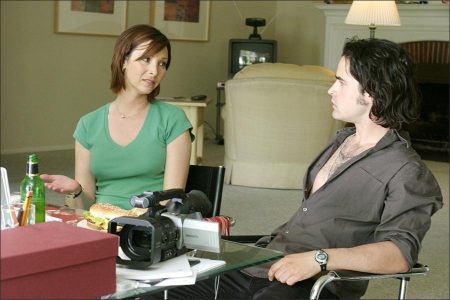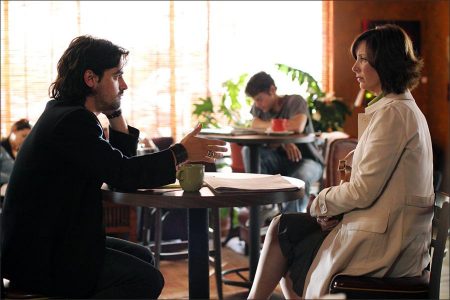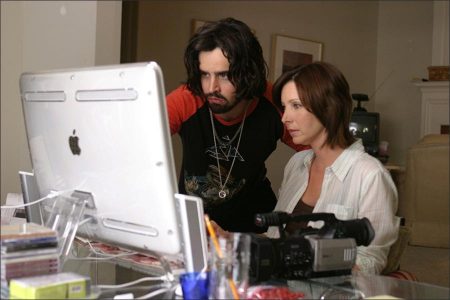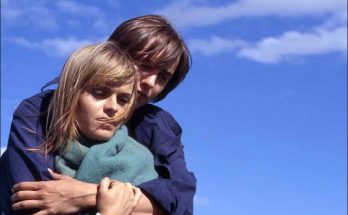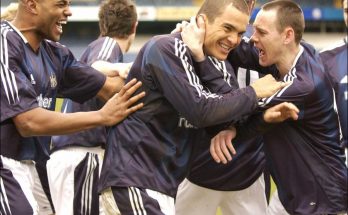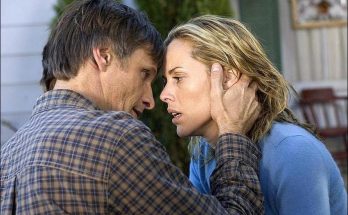Happy Endings Movie Trailer. In her portrayal of Jude, a singer who seduces both a father and his gay son, Maggie Gyllenhaal was careful not to pass judgment on her character. “I think these are situations that all of us have found ourselves in,” she says. “You have to acknowledge the complicated dark things that exist in your life as an audience member. And I think that’s what Don’s encouraging people to do.”
Bobby Cannavale, who plays Mamie’s Mexican boyfriend, Javier, is more blunt: “I think people who are shocked by any of this have their own issues to deal with.”
The script for HAPPY ENDINGS was born out of Roos’s interest in a simple premise: the relationship between a step-brother and a step-sister. “I thought that relationship was an interesting one. So that’s what it started from,” says the writer/director. “Then I asked myself a lot of questions and gradually the world started to build, like putting a grain of sand in an oyster.”
When Roos had finished his script, his modest concept had developed into three distinct story lines with a cast of ten principal characters, all carefully interwoven. The stories are diverse: a woman blackmailed by an aspiring filmmaker; two gay couples in conflict over patrimony rights to a child; a trio consisting of a father, his gay son, and the free-spirited young woman who seduces them both. As disparate as they may be, these full-bodied characters are all unified by their common need and search for love.
“Love is the prime motivating factor for everyone in the film. They’re all seeking love or seeking to love someone,” says Roos. “It’s true in my life, so I assume it’s true in everybody’s life. That’s the kind of ego I have. If it’s true for me, it’s true for you.
And where there is love, there is usually sex. While not an overtly sexual film, each of the varied plots in HAPPY ENDINGS deals in some manner with the emotional consequences of sex, as well as the politics of procreation. “To me, sex is a really incredible, big part of a person’s life,” says Roos. “And I think the creation of a baby, the creation of another consciousness in the universe, is a huge thing. In the movie, Lisa says to Maggie that everything is a much bigger deal than we think. And that’s basically my idea about sex. It’s bigger than we think it is.”
Adds Kudrow, “We think we’re handling the important issues around reproduction, like adoption or abortion or surrogacy. But they’re extremely personal and tricky to legislate. Nothing’s black and white.”
David Suttcliffe, whose character, Gil, finds himself in the middle of a patrimony suit with his best friend, appreciates Roos’s inherent lack of judgment. “Don’s just throwing it out there. He shows the difficulty of these issues without preaching some kind of message.”
“It’s kind of a relief,” admits Sarah Clarke, who plays Diane, one half of a lesbian couple with Dern’s Pam. “When films show those awkward or ugly moments involving sex, it’s so much more human.”
Roos doesn’t shy away from applying his frank, honest approach to the sex act itself, either. As Otis, Frank’s closeted gay son, Jason Ritter was relieved the sex scenes weren’t “just pure stallion love scenes. There’s always something going on, some kind of emotion to play,” says Ritter. “Sex isn’t the ultimate goal of these characters. They’re all looking for something beyond that.”
Lisa Kudrow was the first cast member in the large ensemble to commit to HAPPY ENDINGS, primarily because Roos wrote the part of Mamie expressly for her. “Mamie is a woman who believes she’s in control of her life and she’s really not,” says Kudrow. “She gets to that point in her life where everything gets stripped away from her and she doesn’t have the choice but to confront her secrets.”
While the part supplies Kudrow with a number of Roos’s trademark one-liners, it also allowed Kudrow to explore her less-exposed dramatic side. “I don’t know that I’ve played anyone that truly damaged,” admits the actress. “I just wasn’t expecting to be crying so much in this script. It’s only specified in one spot. But it turns out there’s a lot more there. There are a lot of things that get to her.”
Roos recognizes that Kudrow’s talents, apart from her impeccable comedic timing, are well suited to conveying Mamie’s deep-rooted sense of alienation. “She’s just really good at playing a person who’s not comfortable in their own skin. She’s very good at showing us what it feels like to not feel a part of the world. And she’s just a great actress.”
For Kudrow, HAPPY ENDINGS is an opportunity to work with a friend and a like mind. “It’s the same great experience as the first time,” she says, recalling her collaboration with Roos on THE OPPOSITE OF SEX. “I trust Don completely. The words he writes always make sense. I have a connection with him and what he writes and the story he wants to tell. It’s very fulfilling.”
As Mamie, Kudrow spends most of her screen time opposite actors Bobby Cannavale and Jesse Bradford. Cannavale reports that he relished the opportunity to take on the unique character of Javier, Mamie’s Mexican masseur boyfriend. “I’m always looking to play something completely different from the last time, so people will go, ‘Oh, is that the same guy?’” he says. “Those are my favorite kinds of actors. Always have been.”
For research, Cannavale scheduled a series of massages with different therapists, yet he admits he had trouble relaxing. “I spent the entire hour asking questions. You know, like, ‘What are you doing now?’ ‘What are you doing to my leg?’ ‘Let me see your hands.’”
Bradford immediately connected to Nicky, the offbeat, quasi-loser who blackmails Mamie and Javier into helping him make a movie about sex workers in the massage industry. It’s a character that Roos affectionately refers to as “everybody’s favorite jackass.”
“I just feel like I understand why he is the way he is,” says Bradford. “Not that I sympathize with it, because it’s not exactly right. It’s not the way one should be. But I saw what made him, you know, him.”
Coming to the project later in the casting process, Maggie Gyllenhaal surprised Roos with a completely different take on the character of Jude, the rebellious singer who uses sex to get what she wants. “Maggie just showed it to me and I totally bought it,” remembers Roos. “Without changing a single line, she did something really beautiful that I hadn’t expected. I was really, really thrilled with that.”
Gyllenhaal was equally thrilled with the freedom Roos afforded her. “Don is so comfortable with himself as a director, as a writer, as a thinker, as an artist. It’s fine with him to let someone else have an opinion. I had such a great time.”
Since her character sings in the film, Gyllenhaal volunteered to record her own voice for use in certain scenes – something which turned into an unexpected challenge. “It was much harder than I thought,” she admits. “I had all these covers and protective things on my voice. It took me about two days of, you know, eight hours a day in the studio before I heard something that I felt was really honest.”
Out of Roos’s large ensemble, the casting choice that will probably surprise audiences most is Tom Arnold, who plays Frank, a wealthy playboy Dad who falls in love with Gyllenhaal’s Jude. “This is not a role that people would normally cast me in, the quasi-romantic quasi-leading guy kind of role,” says Arnold. “Don told me that he originally wrote it for me after spending time with me…Uh, I guess in my life, I’ve probably made some mistakes with women.”
“Tom has a huge heart,” says Roos. “Frank is this guy that you think is one way, but inside he’s very, very vulnerable and very open and a very loving guy. And Tom gave me that dichotomy. He was a surprise to some people, but not to me. Frank is very close to who he is.”
Gyllenhaal agrees: “Tom was so open and honest and—not a false thing came out of him. And that is more than I can say about almost any actor. I loved acting with him.”
HAPPY ENDINGS was shot in only thirty days, a relatively short shoot; but Roos adopted a fluid, hand-held shooting style that allowed for experimentation and rapid setups. There was no rehearsal period, so the cast had to work through creative issues while shooting was under way. “From day one the actors had to be there, in character,” says Roos. “There weren’t any days when it was like, ‘Oh these are unimportant scenes.’”
For Steve Coogan and David Sutcliffe, two straight actors playing a gay couple, there was no time to adjust gradually to their on-screen relationship. “There’s something to be said for throwing it all away and saying, ‘Let’s just do it,’” says Sutcliffe. “If both people are open enough, you just make it happen in a second. It’s just like, ‘Bang, here he is. This is my guy.’”
“To make something believable, it requires something genuine. You have to have a certain generosity of spirit towards your fellow actors,” says Coogan. “This is a stellar cast of highly competent actors who all raise the game. It makes you work that little bit harder.”
Coogan also credits Roos’s writing for making such a fast shoot possible. “Every word is so well thought out,” he says. “Don’s very detailed. So, for an actor, it’s just a case of doing justice to the script. That’s why it’s a pleasure and a privilege to be involved in his work.”
Ritter agrees wholeheartedly. “He really puts a lot of thought into the past, present and future of these characters and that’s just so liberating,” he says.
Despite the creative constraints of a short production schedule, the cast members unanimously agree it was one of the best shooting experiences they’ve had. “Don is amazing on set,” reports Cannavale. “We’ve had nothing but good times.”
“He’s just very relaxed and very funny,” adds Sutcliffe, “but also very clear about what he wants and what he likes. He’s terrific.”
Says Arnold, “This is a different kind of set. Everybody from top to bottom just wants to be here. Nobody’s making the big bucks. They just believe in Don and what he’s written. I’m so happy to be a part of it. The whole experience is a happy ending.”
Indeed, the title ‘HAPPY ENDINGS’ seems to lend itself to a variety of interpretations, some of which, at least, Roos intended. “Well, in a massage if um, if the masseur drifts into an area and stays there for a while, the massage ends happily,” says the director dryly.
Then he adds, “In the world I’m creating, even people who do really bad things like blackmail and extortion and lying and trickery end up in some way happy. So I did want happy endings. I like happy endings. It’s hard to get an audience to believe in a sincere happy ending. So that was a challenge and I wanted to do that.”
“I think the movie leaves everybody a little bit shifted, a little bit moved. Healthy and happy, but also a lot of other things,” says Gyllenhaal. “Also broken, still. Also sad. Also lost. The way life is.”
“People can achieve a kind of equilibrium rather then a constant state of happiness,” offers Coogan. “That’s what ‘HAPPY ENDINGS’ means.”
For Dern, the title is at once sincere and irreverent, a juxtaposition that seems to encapsulate Roos’s sensibility. “True happiness is about truth. It’s not going to be wrapped up in a perfect bow,” she says. “Being human is more of a happy ending than some Disney-ized version, which frankly terrified us all as children. Real life can be damn fun if you live it from your heart. And it just feels like that’s his point of view and I love him for that.”
“This movie is about the human comedy,” adds Roos. “You get, if you’re lucky, eighty years on a planet, and all the time you’re here you know you’re dying. You have a mix of these powerful ideals and very animalistic yearnings. You’re very, very private and nobody really knows you and you have to get your satisfaction from fellow creatures like yourself. I just think the human story is an interesting one. We’re animals who think we’re Gods.”
Roos hopes that the desires and foibles of his characters will resonate on a personal level with audiences. “Hopefully, they will laugh and they will be moved,” says the filmmaker. “They’ll see people like themselves in one respect doing extraordinary things but behaving like real people. And I think they’ll enjoy the world they’re in. I did, you know. I certainly did making it. So I hope they will, too.”
Happy Endings (2005)
Directed by: Don Roos
Starring: Lisa Kudrow, Maggie Gyllenhaal, Steve Coogan, Laura Dern, Jesse Bradford, Jason Ritter, David Sutcliffe, Sarah Clarke, Amanda Foreman, Sarah Clarke, Kim Morgan Greene
Screenplay by: Don Roos
Production Design by: Richard Sherman
Cinematography by: Clark Mathis
Film Editing by: David Codron
Costume Design by: Peggy A. Schnitzer
Set Decoration by: Matthew Flood Ferguson
MPAA Rating: R for sexual content, language and some drug use.
Distributed by: Lionsgate Films
Release Date: July 15, 2005
Views: 157
